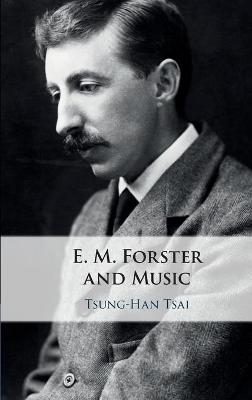
E. M. Forster and Music
Seiten
2021
Cambridge University Press (Verlag)
978-1-108-84431-4 (ISBN)
Cambridge University Press (Verlag)
978-1-108-84431-4 (ISBN)
This book illustrates how Forster's musical politics resonate across his oeuvre, uncovering the ideological force of his engagement with and representations of music by exploring overlooked contexts including: race and rhythm; material culture and empire; literary heritage and national character; hero-worship and war; gender and professionalism.
This book examines the political resonances of E. M. Forster's representations of music, offering readings of canonical and overlooked works. It reveals music's crucial role in his writing and draws attention to a previously unacknowledged eclecticism and complexity in Forster's ideological outlook. Examining unobtrusive musical allusions in a variety of Forster's writings, this book demonstrates how music provided Forster with a means of reflecting on race and epistemology, material culture and colonialism, literary heritage and national character, hero-worship and war, and gender and professionalism. It unveils how Forster's musical representations are mediated through a matrix of ideas and debates of his time, such as those about evolution, empire, Britain's relationship with the Continent, the rise of fascism, and the emergence of musicology as an academic discipline.
This book examines the political resonances of E. M. Forster's representations of music, offering readings of canonical and overlooked works. It reveals music's crucial role in his writing and draws attention to a previously unacknowledged eclecticism and complexity in Forster's ideological outlook. Examining unobtrusive musical allusions in a variety of Forster's writings, this book demonstrates how music provided Forster with a means of reflecting on race and epistemology, material culture and colonialism, literary heritage and national character, hero-worship and war, and gender and professionalism. It unveils how Forster's musical representations are mediated through a matrix of ideas and debates of his time, such as those about evolution, empire, Britain's relationship with the Continent, the rise of fascism, and the emergence of musicology as an academic discipline.
Tsung-Han Tsai is an independent scholar specializing in music and twentieth-century literature. Since receiving his Ph.D. from the University of St Andrews, he has co-edited, with Emma Sutton, Twenty-First-Century Readings of E. M. Forster's Maurice, and has published articles on Forster, Goldsworthy Lowes Dickinson, and life-writing.
Introduction; 1. The Rhythm of the Racial Other: Before Aspects of the Novel; 2. The Queering of Musical Instruments; 3. From Literary Heritage to National Character; 4. The Problem of the Wagnerian Hero; 5. Amateurism, Musicology, and Gender; Postlude.
| Erscheinungsdatum | 17.05.2021 |
|---|---|
| Zusatzinfo | Worked examples or Exercises |
| Verlagsort | Cambridge |
| Sprache | englisch |
| Maße | 230 x 150 mm |
| Gewicht | 460 g |
| Themenwelt | Kunst / Musik / Theater ► Musik |
| Geisteswissenschaften ► Sprach- / Literaturwissenschaft ► Anglistik / Amerikanistik | |
| Geisteswissenschaften ► Sprach- / Literaturwissenschaft ► Literaturwissenschaft | |
| ISBN-10 | 1-108-84431-6 / 1108844316 |
| ISBN-13 | 978-1-108-84431-4 / 9781108844314 |
| Zustand | Neuware |
| Informationen gemäß Produktsicherheitsverordnung (GPSR) | |
| Haben Sie eine Frage zum Produkt? |
Mehr entdecken
aus dem Bereich
aus dem Bereich
Poetik eines sozialen Urteils
Buch | Hardcover (2023)
De Gruyter (Verlag)
CHF 83,90
Buch | Softcover (2024)
belleville (Verlag)
CHF 27,95


